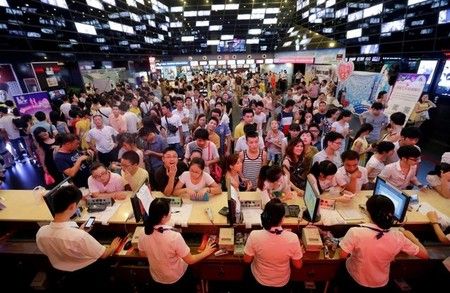Advertisement
Fast and furious? China’s stalling box office points to consumer slowdown

By Adam Jourdan
SHANGHAI (Reuters) – China’s cinemas are showing signs of weakness, a concern for policymakers who had looked to stellar box office receipts over the last half-decade as a sign consumers were picking up some of the slack from ailing exports and manufacturing.
Ticket sales dropped 10 percent in the second quarter of the year versus 2015, the first dip in around five years and a far cry from stellar growth at the start of the year. July sales slumped further, data from box office tracker EntGroup showed.
Stalling sales suggest belt-tightening by China’s consumers is hitting even small luxuries and everyday discretionary spending, a concern for the Hollywood producers wooing China and for Beijing as it struggles to stoke domestic demand.
“Cinema tickets are expensive and now there are lots more places to find movies, so everyone is choosing to stay at home and watch films online,” said Zhang Fuling, 25, a service worker at a state-owned firm in Shanghai.
Zhang is not alone: visits to cinemas fell 15 percent in July, after growing more than 50 percent last year and at the start of 2016. Average ticket prices have also dropped to the lowest level in more than five years.
Some analysts point to a recent crackdown on producers subsidizing or buying up unsold tickets to inflate box office sales as also weighing on the sector, though similar campaigns failed to dent growth in 2014 or 2015.
With China’s official data viewed with scepticism by some economists, any indicators that may offer a snapshot of the state of the real economy are eagerly watched.
Increasing domestic consumption is key to Beijing’s efforts to rebalance the world’s second biggest economy away from its long-running reliance on trade and government spending.
STAYING HOME
Stalling cinema ticket sales are not the only red flag that consumers might be feeling the pinch.
Outbound tourist numbers are also set to flatline this year, according to China National Tourism Administration (CNTA) data. Outbound tourists – another bellwether of consumer strength – had risen steeply for years and were up 16 percent in 2015.
“If you can rule out other drivers then you’d have to say it’s a sign that consumers are becoming more cautious,” said Matthew Hassan, senior economist at Westpac, referring to the weaker box office and tourist numbers.
Westpac’s own China consumer sentiment index fell in July.
“Aspects of the survey around job security, around savings behavior do look a lot more conservative, and it may be that there has been a budgetary tightening in the consumer sector,” said Hassan.
Chinese retailers have also cut staff and seen inventories pile up, luxury sector growth has dried up, and fast-food giants such as KFC-parent Yum Brands Inc <YUM.N> and McDonald’s Corp <MCD.N> are grappling for growth.
BOX OFFICE BUBBLE?
Cinema ticket sales have a history of resilience even in the face of slowing economic growth. The U.S. box office boomed in 2009 after the financial crisis as people looked to the silver screen for an affordable two-hour escape.
In China, even as the country faced its slowest growth in a quarter of a century, cinema ticket sales shot up at the start of the year, with record numbers flocking to see movies like quirky romantic comedy “The Mermaid”, driving it to break China’s all-time box office record.
Industry insiders, however, said some of that growth was artificial, driven by cut-price deals and producers buying up or subsidizing tickets.
“Local film investors had been buying up lots of tickets for their own films, stoking a film market bubble,” said Song Yuxing, an academic and independent film maker. He added slower economic growth was also a drag on domestic films getting made.
Cinema operators such as Wanda Cinema Line Corp <002739.SZ>, China’s largest, have seen the impact. Wanda’s box office sales were up 12.8 percent in the second quarter of the year, versus 61.4 percent growth in the first three months.
To be sure, the Chinese box office has raked in $4.5 billion so far this year and is expected to soon challenge the U.S. market for the crown of the world’s biggest.
The United States has five times as many cinema screens per person as China – leaving plenty of room for growth.
“The Mermaid”, car-chase action flick “Furious 7”, local hit “Monster Hunt” and Walt Disney Co’s <DIS.N> animation “Zootopia” have seen big returns in China over the last two years.
The dip could also be short-lived, with some saying there had simply been a lack of recent blockbuster hits.
“A lot of domestic films lately haven’t really gone down well and lots of viewers feel there isn’t much worth watching,” said Wang Xin, a box office worker at the Stellar International Cineplex in central Shanghai. She added many people were also bringing ticket coupons to get discounts.
“The trouble is, if there aren’t any good films on offer then getting a discount doesn’t really make a difference.” ($1 = 6.6440 Chinese yuan renminbi)
(Reporting by Adam Jourdan and SHANGHAI newsroom; Editing by Alex Richardson)











